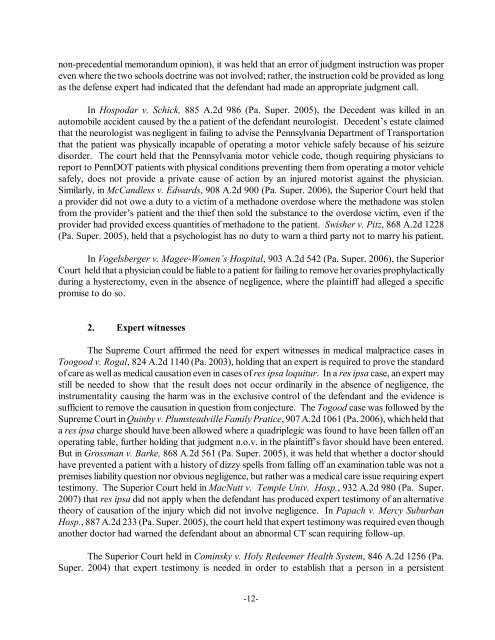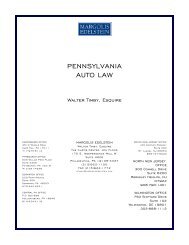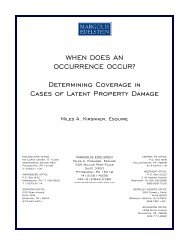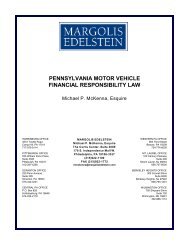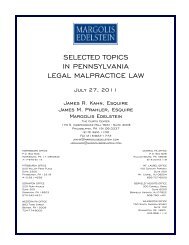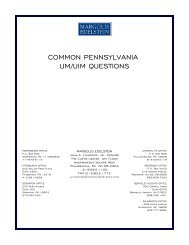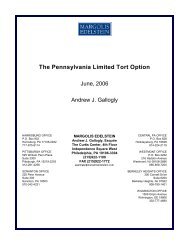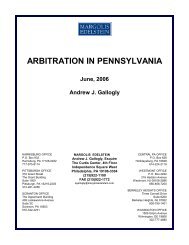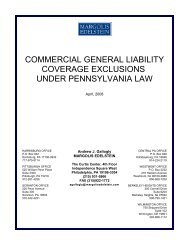recent developments in pennsylvania medical malpractice law
recent developments in pennsylvania medical malpractice law
recent developments in pennsylvania medical malpractice law
Create successful ePaper yourself
Turn your PDF publications into a flip-book with our unique Google optimized e-Paper software.
non-precedential memorandum op<strong>in</strong>ion), it was held that an error of judgment <strong>in</strong>struction was propereven where the two schools doctr<strong>in</strong>e was not <strong>in</strong>volved; rather, the <strong>in</strong>struction cold be provided as longas the defense expert had <strong>in</strong>dicated that the defendant had made an appropriate judgment call.In Hospodar v. Schick, 885 A.2d 986 (Pa. Super. 2005), the Decedent was killed <strong>in</strong> anautomobile accident caused by the a patient of the defendant neurologist. Decedent’s estate claimedthat the neurologist was negligent <strong>in</strong> fail<strong>in</strong>g to advise the Pennsylvania Department of Transportationthat the patient was physically <strong>in</strong>capable of operat<strong>in</strong>g a motor vehicle safely because of his seizuredisorder. The court held that the Pennsylvania motor vehicle code, though requir<strong>in</strong>g physicians toreport to PennDOT patients with physical conditions prevent<strong>in</strong>g them from operat<strong>in</strong>g a motor vehiclesafely, does not provide a private cause of action by an <strong>in</strong>jured motorist aga<strong>in</strong>st the physician.Similarly, <strong>in</strong> McCandless v. Edwards, 908 A.2d 900 (Pa. Super. 2006), the Superior Court held thata provider did not owe a duty to a victim of a methadone overdose where the methadone was stolenfrom the provider’s patient and the thief then sold the substance to the overdose victim, even if theprovider had provided excess quantities of methadone to the patient. Swisher v. Pitz, 868 A.2d 1228(Pa. Super. 2005), held that a psychologist has no duty to warn a third party not to marry his patient.In Vogelsberger v. Magee-Women’s Hospital, 903 A.2d 542 (Pa. Super. 2006), the SuperiorCourt held that a physician could be liable to a patient for fail<strong>in</strong>g to remove her ovaries prophylacticallydur<strong>in</strong>g a hysterectomy, even <strong>in</strong> the absence of negligence, where the pla<strong>in</strong>tiff had alleged a specificpromise to do so.2. Expert witnessesThe Supreme Court affirmed the need for expert witnesses <strong>in</strong> <strong>medical</strong> <strong>malpractice</strong> cases <strong>in</strong>Toogood v. Rogal, 824 A.2d 1140 (Pa. 2003), hold<strong>in</strong>g that an expert is required to prove the standardof care as well as <strong>medical</strong> causation even <strong>in</strong> cases of res ipsa loquitur. In a res ipsa case, an expert maystill be needed to show that the result does not occur ord<strong>in</strong>arily <strong>in</strong> the absence of negligence, the<strong>in</strong>strumentality caus<strong>in</strong>g the harm was <strong>in</strong> the exclusive control of the defendant and the evidence issufficient to remove the causation <strong>in</strong> question from conjecture. The Togood case was followed by theSupreme Court <strong>in</strong> Qu<strong>in</strong>by v. Plumsteadville Family Pratice, 907 A.2d 1061 (Pa. 2006), which held thata res ipsa charge should have been allowed where a quadriplegic was found to have been fallen off anoperat<strong>in</strong>g table, further hold<strong>in</strong>g that judgment n.o.v. <strong>in</strong> the pla<strong>in</strong>tiff’s favor should have been entered.But <strong>in</strong> Grossman v. Barke, 868 A.2d 561 (Pa. Super. 2005), it was held that whether a doctor shouldhave prevented a patient with a history of dizzy spells from fall<strong>in</strong>g off an exam<strong>in</strong>ation table was not apremises liability question nor obvious negligence, but rather was a <strong>medical</strong> care issue requir<strong>in</strong>g experttestimony. The Superior Court held <strong>in</strong> MacNutt v. Temple Univ. Hosp., 932 A.2d 980 (Pa. Super.2007) that res ipsa did not apply when the defendant has produced expert testimony of an alternativetheory of causation of the <strong>in</strong>jury which did not <strong>in</strong>volve negligence. In Papach v. Mercy SuburbanHosp., 887 A.2d 233 (Pa. Super. 2005), the court held that expert testimony was required even thoughanother doctor had warned the defendant about an abnormal CT scan requir<strong>in</strong>g follow-up.The Superior Court held <strong>in</strong> Com<strong>in</strong>sky v. Holy Redeemer Health System, 846 A.2d 1256 (Pa.Super. 2004) that expert testimony is needed <strong>in</strong> order to establish that a person <strong>in</strong> a persistent-12-


